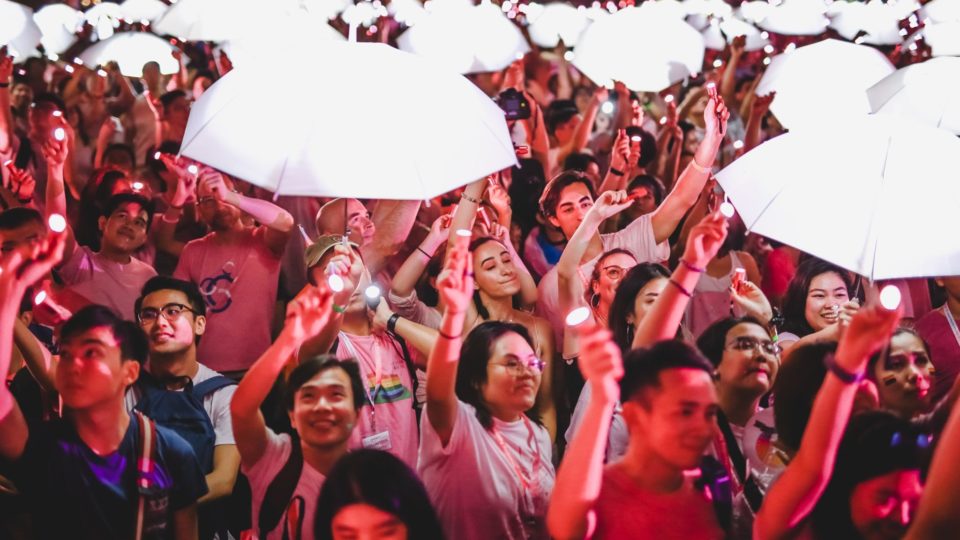Less reliance on fossil fuels and discrimination against minorities are just some of the issues young Singaporeans care about and want debated in Parliament after they go to the polls next week.
While several political parties have unveiled their manifestos, some of which address issues concerning young people including first-time Gen Z voters, a chat with various youth organizations by Coconuts Singapore found there are still gaps.
For example, none of the parties has specifically recommended policies to further support the local queer community in terms of workplace discrimination, mental health, and of course, the law banning sex between two consenting adult men.
LGBT organization Oogachaga, anti-racism advocacy group NotOK Singapore, foreign domestic worker rights advocates MaidForMore, SG Climate Rally and the Singapore Youth for Climate Action group tell us more.
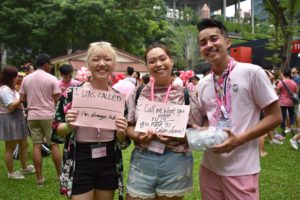
Broaden debate on LGBTQ issues
Issues affecting Singapore’s LGBT community have largely centered around repealing the gay sex law, more popularly known as S377A. But Oogachaga executive director Leow Yangfa said there is more to that, and those issues should be brought up in Parliament.
The community-based nonprofit, comprised of people from their 20s to 40s, has been tackling LGBT matters since 1999. Leow said other issues such as discriminatory media guidelines and censorship; registration of LGBTQ organizations; education and well-being of LGBTQ youths; workplace discrimination and healthcare and social services, should be addressed in Parliament.
“Conversations about the local LGBTQ+ community have mostly been centred around the repeal of Section 377A of the Penal Code. While it remains important to discuss 377A and its implications, other topics surrounding the needs of the LGBTQ+ community, such as the issues above, should also be addressed in Parliament,” he told Coconuts Singapore this week.
“It is important to note that as the legislature, Singapore’s Parliament is more than about making speeches and statements. Discussions have to go beyond that, which includes passing legislation that will protect LGBTQ+ Singaporeans and ensure equality,” he added.
Those were also the issues Oogachaga had written to the U.N. Human Rights Council together with the organizers of the Pink Dot pride rally in the hope it could help improve the human rights situation of LGBT individuals in Singapore.
Adding to the list of issues affecting queer life in Singapore for Parliament, LGBT youth support group Young Out Here spoke out on the lack of policy focus on mental health issues affecting Singaporeans, including young LGBT individuals.
“As we are electing the next generation of leaders for Singapore, Parliament should increase the time talking about mental health and its importance for the population, including the LGBTQ+ community,” co-founder Benjamin Xue, 37, told Coconuts Singapore recently. “Often important issues like these are debated without any community input from the segments of the population that is affected the most.”
The group comprises 150 youths, from as young as 16, who provide safe spaces for mental health support at home and school. But support services alone are not enough, Xue said, describing it as only one element that needs to be strengthened.
“However, that’s just one pillar of possible support for LGBTQ+ youth, the other two would be schools and families. We hope over the next few years, those pillars of support could be strengthened for LGBTQ+ youth in Singapore,” he said.
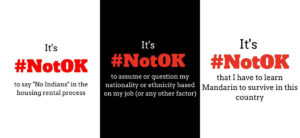
Racial discrimination
On the subject of Singapore’s minority groups, young people also want discrimination to be addressed in parliament, particularly affecting housing, education, and employment.
NotOK Singapore is one group pushing for greater racial equity. The community raises awareness through social media campaigns such as urging people to share their experiences with racism.
Co-editor Akanksha Raja raised issues that need addressing such as the Special Assistance Plan, or SAP, which reserves school admissions to Chinese-speakers. She also pointed out the issue of jobs requiring applicants to speak Mandarin and the prevalence of landlords who reject Indian tenants.
“We’d love to hear stronger policies to tackle race-based discrimination in areas such as housing, employment, and education,” she said.
Raja, 28, said “No Indians” could still be found in property listings and Mandarin required for jobs where it wasn’t relevant. “We hear of people being rejected for jobs because they wear a headscarf or observe certain religious practices,” she said.
Additionally, SAP schools which are exclusive to Mandarin speakers mean students who aren’t must have studied Chinese at Primary School Leaving Examinations to get in.
None of the parties has specifically touched on those issues. However, the Workers’, Singapore Democratic, and the Singapore Peoples’ parties have proposed that racial housing quotas be abolished. Those quotas are made possible by Singapore’s Ethnic Integration Policy, which was meant to ensure balanced racial representation in neighborhoods, at least between Malays, Chinese, and Indians. All other races are categorized as “Others.”
Red Dot United is the only party calling for better education on race and religion. The party called for a review of the National Education framework in its manifesto to make sure that students have a deeper understanding of the different ethnic and religious groups in Singapore.
Controversial racial issues should be discussed more openly in Parliament “in order to become a better, more inclusive and welcoming home for all of us,” Raja added.
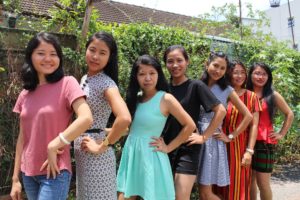
Migrant domestic workers
Youths also hope that Parliament can better protect migrant domestic workers from poor labor standards and abuse.
Nessa Swinn, the founder of advocacy group MaidForMore, noted that Singapore’s foreign maids are not protected by the Employment Act, and instead tied to the terms of their employment contracts. She’d like the government to take more responsibility instead of leaving things up to employment agencies and employers by enforcing stricter labor laws.
She noted that the issue has been brought in Parliament before, but the outcome was unsatisfactory. The Manpower Ministry says online that such workers are not covered by the act “because it is not practical to regulate specific aspects of domestic work, such as hours of work and work on public holidays.”
“The government’s rationale for the exclusion of domestic workers from the Employment Act is based on grounds of impracticability,” Swinn said. The act regulates labor hours, among other aspects.”
She said that although “positive policy developments have been made over the years” to stem “more egregious forms of abuse,” the government’s stance on labor standards hasn’t changed.
While there are no specific mentions of domestic workers in any of the political parties’ manifestos, Red Dot United had proposed revising the Employment Act to prevent errant employers from abusing the distinction between employees and independent contractors.
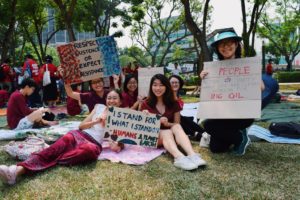
Switch to renewable energy; enforce haze pollution law
Other than paying better attention to minorities, Singapore’s young climate activists want Parliament to reduce reliance on the petrochemicals industry, seek renewable energy sources, and better enforce the Transboundary Haze Pollution Act.
“As a movement, we want to see bolder mitigation measures alongside an explicit shift away from fossil fuels, among other things,” said Kristian Paul, member of climate action advocacy collective SG Climate Rally.
Echoing Paul’s sentiment are Wong Jun Hao and Adil Hakeem Mohamad Rafee, who are members of Singapore Youth for Climate Action. They hope to hear Parliament members discuss ways to restructure the economy and energy industry in a more sustainable way.
“I think there should also be greater effective and genuine partnerships with civil society and activist groups in collaborating on more ambitious climate actions and policies,” Wong, 23, said.
“I’d like to hear more about our plans to grow our renewable energy industry in Singapore. We’ve heard a lot about other climate-related initiatives, but very little about how to replace the petrochemical industry as a source of economic growth in the long term,” Hakeem, 27, said.
While such issues have been discussed in Parliament, Wong notes that it is not “nearly enough.”
“There doesn’t seem to be a nationwide or industry-wide shift that will bring significant enough change. It is however understandable given the circumstance of Singapore and how important staying relevant to the global economy is, but still, more can be and should be done,” Wong said.
There are also demands for Singapore to better enforce its 2014 Transboundary Haze Pollution Act and hold Singapore-based businesses accountable for the forest fires that occur mostly in Indonesia and Borneo but blanket the city with smoke. The executive director of a nonprofit campaigning against the smog suggested more Parliamentary discussions on supporting the production of sustainable palm oil.
“I believe that our government has the potential to help the industry progress further in their sustainability standards. This could be done through a sustainable palm oil procurement policy for the food and beverage and hospitality sectors in Singapore,” Benjamin Tay from People’s Movement to Stop Haze said, noting that Singapore uses 230,000 metric tonnes of palm oil annually.
Both Red Dot United and Singapore Democratic Party have proposed better enforcement of the haze act. The latter stated that it would prosecute “business entities operating in Singapore that are linked with companies engaged in forest-burning in Indonesia.”
The Workers’ Party said it targets a 10% minimum of Singapore’s energy to come from renewable resources by 2025, while The Reform Party proposed heavier investment in renewable energy.
Other stories you should check out:
GE2020: Election map takes shape as candidates register to run
GE2020: Nearly 200 candidates register to run in Singapore’s election
GE2020: Here’s what’s different about Singapore’s election this time
SG Elections: Gauging the 2020 election by internet points
